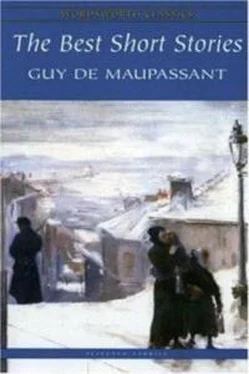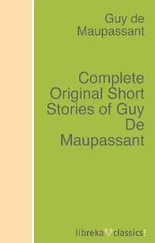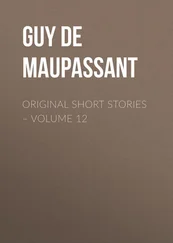Then he saw a form, the form of a man sitting on the manure heap!
He gazed at it, paralyzed by fear, and breathing hard. But all at once he saw, close by, the handle of the manure fork which was sticking in the ground. He snatched it up and in one of those transports of fear that will make the greatest coward brave he rushed forward to see what it was.
It was he, his Prussian, come to life, covered with filth from his bed of manure which had kept him warm. He had sat down mechanically, and remained there in the snow which sprinkled down, all covered with dirt and blood as he was, and still stupid from drinking, dazed by the blow and exhausted from his wound.
He perceived Anthony, and too sodden to understand anything, he made an attempt to rise. But the moment the old man recognized him, he foamed with rage like a wild animal.
"Ah, pig! pig!" he sputtered. "You are not dead! You are going to denounce me now—wait—wait!"
And rushing on the German with all the strength of leis arms he flung the raised fork like a lance and buried the four prongs full length in his breast.
The soldier fell over on his back, uttering a long death moan, while the old peasant, drawing the fork out of his breast, plunged it over and over again into his abdomen, his stomach, his throat, like a madman, piercing the body from head to foot, as it still quivered, and the blood gushed out in streams.
Finally he stopped, exhausted by his arduous work, swallowing great mouthfuls of air, calmed down at the completion of the murder.
As the cocks were beginning to crow in the poultry yard and it was near daybreak, he set to work to bury the man.
He dug a hole in the manure till he reached the earth, dug down further, working wildly, in a frenzy of strength with frantic motions of his arms and body.
When the pit was deep enough he rolled the corpse into it with the fork, covered it with earth, which he stamped down for some time, and then put back the manure, and he smiled as he saw the thick snow finishing his work and covering up its traces with a white sheet.
He then stuck the fork in the manure and went into the house. His bottle, still half full of brandy stood on the table. He emptied it at a draught, threw himself on his bed and slept heavily.
He woke up sober, his mind calm and clear, capable of judgment and thought.
At the end of an hour he was going about the country making inquiries everywhere for his soldier. He went to see the Prussian officer to find out why they had taken away his man.
As everyone knew what good friends they were, no one suspected him. He even directed the research, declaring that the Prussian went to see the girls every evening.
An old retired gendarme who had an inn in the next village, and a pretty daughter, was arrested and shot.
Lasting Love
It was the end of the dinner that opened the shooting season. The Marquis de Bertrans with his guests sat around a brightly lighted table, covered with fruit and flowers. The conversation drifted to love. Immediately there arose an animated discussion, the same eternal discussion as to whether it were possible to love more than once. Examples were given of persons who had loved once; these were offset by those who had loved violently many times. The men agreed that passion, like sickness, may attack the same person several times, unless it strikes to kill. This conclusion seemed quite incontestable. The women, however, who based their opinion on poetry rather than on practical observation, maintained that love, the great passion, may come only once to mortals. It resembles lightning, they said, this love. A heart once touched by it becomes forever such a waste, so ruined, so consumed, that no other strong sentiment can take root there, not even a dream. The marquis, who had indulged in many love affairs, disputed this belief.
"I tell you it is possible to love several times with all one's heart and soul. You quote examples of persons who have killed themselves for love, to prove the impossibility of a second passion. I wager that if they had not foolishly committed suicide, and so destroyed the possibility of a second experience, they would have found a new love, and still another, and so on till death. It is with love as with drink. He who has once indulged is forever a slave. It is a thing of temperament."
They chose the old doctor as umpire. He thought it was as the marquis had said, a thing of temperament.
"As for me," he said, "I once knew of a love which lasted fifty–five years without one day's respite, and which ended only with death." The wife of the marquis clasped her hands.
"That is beautiful! Ah, what a dream to be loved in such a way! What bliss to live for fifty–five years enveloped in an intense, unwavering affection! How this happy being must have blessed his life to be so adored!"
The doctor smiled.
"You are not mistaken, madame, on this point the loved one was a man. You even know him; it is Monsieur Chouquet, the chemist. As to the woman, you also know her, the old chair–mender, who came every year to the chateau." The enthusiasm of the women fell. Some expressed their contempt with "Pouah!" for the loves of common people did not interest them. The doctor continued: "Three months ago I was called to the deathbed of the old chair–mender. The priest had preceded me. She wished to make us the executors of her will. In order that we might understand her conduct, she told us the story of her life. It is most singular and touching: Her father and mother were both chair–menders. She had never lived in a house. As a little child she wandered about with them, dirty, unkempt, hungry. They visited many towns, leaving their horse, wagon and dog just outside the limits, where the child played in the grass alone until her parents had repaired all the broken chairs in the place. They seldom spoke, except to cry, 'Chairs! Chairs! Chair–mender!'
"When the little one strayed too far away, she would be called back by the harsh, angry voice of her father. She never heard a word of affection. When she grew older, she fetched and carried the broken chairs. Then it was she made friends with the children in the street, but their parents always called them away and scolded them for speaking to the barefooted child. Often the boys threw stones at her. Once a kind woman gave her a few pennies. She saved them most carefully.
"One day—she was then eleven years old—as she was walking through a country town she met, behind the cemetery, little Chouquet, weeping bitterly, because one of his playmates had stolen two precious liards (mills). The tears of the small bourgeois, one of those much–envied mortals, who, she imagined, never knew trouble, completely upset her. She approached him and, as soon as she learned the cause of his grief, she put into his hands all her savings. He took them without hesitation and dried his eyes. Wild with joy, she kissed him. He was busy counting his money, and did not object. Seeing that she was not repulsed, she threw her arms round him and gave him a hug—then she ran away.
"What was going on in her poor little head? Was it because she had sacrificed all her fortune that she became madly fond of this youngster, or was it because she had given him the first tender kiss? The mystery is alike for children and for those of riper years. For months she dreamed of that corner near the cemetery and of the little chap. She stole a sou here and, there from her parents on the chair money or groceries she was sent to buy. When she returned to the spot near the cemetery she had two francs in her pocket, but he was not there. Passing his father's drug store, she caught sight of him behind the counter. He was sitting between a large red globe and a blue one. She only loved him the more, quite carried away at the sight of the brilliant–colored globes. She cherished the recollection of it forever in her heart. The following year she met him near the school playing marbles. She rushed up to him, threw her arms round him, and kissed him so passionately that he screamed, in fear. To quiet him, she gave him all her money. Three francs and twenty centimes! A real gold mine, at which he gazed with staring eyes.
Читать дальше












